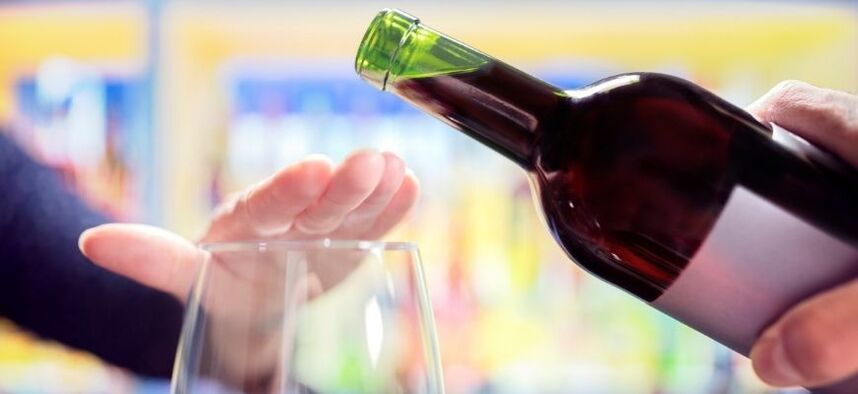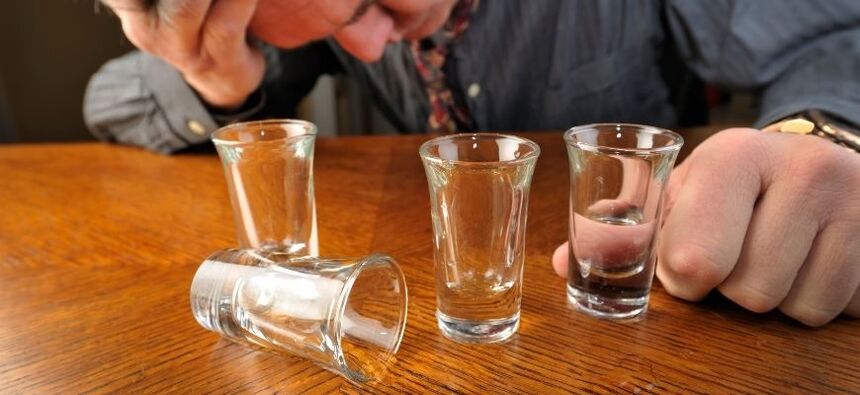Treatment of any form of alcoholism involves the complete refusal of alcohol by the patient. The success of therapy is reduced to zero if the patient does not want a person to live in a state of consciousness. In contrast, one's awareness of one's own illness is already the first step toward achieving remission. Such awareness is the result of a very complex work process of oneself and requires a great deal of time and effort. Therefore, to quit drinking, it is best to consult a doctor.

Reasons to stop drinking
There are many reasons why a person stops drinking. Among the most important are:
- desire to be healthy;
- deterioration of the state of health and the development of chronic diseases;
- appear more attractive in people who have no problems with alcohol;
- an alert, sharp and undisturbed mind, desiring to be fully aware of the surrounding reality;
- high efficiency;
- good attitude at work and an impeccable reputation;
- save money (financial spending on alcohol always makes up a significant part of the budget of an alcoholic);
- high sex drive, no problems with potency in men or menstrual cycle in women;
- the presence of strength and time (after all, the life of a person steeped in alcohol is guided by one desire - to drink);
- great state of mind, cheerfulness;
- healthy atmosphere at home;
- full, bright and healthy life;
- healthy children.
The road to a sober life is long and difficult. However, a person has a chance to get rid of addiction by following the advice of doctors. The most important thing for this is to have a desire to be cured and an iron will.

Can a person stop drinking on their own?
Doctors warn: no former alcoholic. Alcoholism is an incurable disease. However, there is always a chance that patients will be in stable remission and stop drinking. The duration of the sobriety phase can vary and can range from months to decades.
Mental interventions are effective for stopping alcohol consumption. They allow you to inspire patients to have a negative attitude towards alcohol and thus prevent relapses. For a positive outcome, a strong belief is formed that he can lead a healthy and fulfilling life without drinking a single drop of alcoholic beverage.
Successful treatment of alcoholism depends on a large number of factors. Most significantly, the person decides for himself whether to drink or not.
Natural remission
It is very rare for a person to stop drinking alcohol spontaneously. A certain factor drives this: accepting one's own illness and then deciding that something needs to be changed in one's life.
The main disadvantage of spontaneous remission is that the duration and spontaneity are unknown.
Reduced motivation
In this case, a person consciously refuses to drink alcohol. This happens more often if there is a threat to a person's life. Consciously refusing alcohol, a person also raises some financial problems, and also solves the problem of keeping the family.
Gradually, a person comes to the conclusion that a complete refusal of alcohol will allow him to achieve his goals in life and consolidate success. In remission, he was fully convinced that his choice was the right one and the first priority, despite the presence of temptations. Moreover, each victory over alcohol and the approval of those around him reinforces a position of sobriety.
Forced reduction
Not always a person voluntarily strives for a sober lifestyle. Many alcoholics don't always understand how harmful their bad habits can be. However, circumstances change. For example, if the working director or spouse, the child puts a person in front of the choice, he needs to comply. Otherwise, it will be visible throughout the life of an alcoholic.
Forced remission is usually not long-lasting. Moreover, a person is constantly in a state of stress, because he has to experience difficulties and inconveniences from such coercion. Such a breakdown after remission often has very serious consequences.
Somatogenic remission
If a person learns of a serious deterioration in health, he usually stops drinking. The most common situation is when a patient needs to quit drinking after a delirium.
In addition, alcoholics fear the consequences of a serious illness they've experienced (for example, a heart attack or stroke). Against the background of negative emotions, they completely lose their attraction to alcohol. Awareness of the harmful effects of alcohol, albeit belatedly, has formed a new attitude: prioritizing survival over short-term drinking and drunkenness.
Psychological remission
This variant of alcohol withdrawal is associated with remission of somatogenic disease. When a person found out what he was doing while drunk, he experienced a great shock. In a state of shame at his actions, he decided to stop drinking.
There could be many such reasons. Usually it is:
- traffic accidents caused by drunkenness;
- an attempt on their own children's lives;
- violence.
Such remission is unstable and short-lived. Sometimes a strong stimulant works in the opposite direction, and the person begins to drink more. In the state of intoxication, suicide is not excluded.
Post-intoxication remission
The nature of this remission cannot be fully established. It is typical for people who regularly abuse alcoholic beverages. One day they stopped drinking, and they did not dispute the decision.
Doctors believe that at some point, poisoning of ethyl alcohol and its decay products reaches critical limits. At this time, biochemical processes in the brain change, and an aversion to alcohol appears. Notably, the taste and smell of alcohol suddenly became unpleasant. Even small doses cause nausea and vomiting.
Post-intoxication remission is relatively stable. However, cases of relapse are not excluded, when, against the background of a sober lifestyle, a person's state of health improves significantly.

Advice for those who want to quit drinking
Not any person who has previously abused alcohol can easily tolerate sobriety. Some have an unpleasant craving for alcohol, wanting to give up a drink or two right away. For those who firmly and confidently embark on the path of sobriety, such advice can be helpful.
- You should contact a specialist clinic. Here, specialist doctors will choose their own treatment plan, prescribe effective drugs if necessary. Psychologists and rehabilitation specialists will help you get out of drunkenness, cleanse your body and develop a persistent negative attitude to the use of ethanol.
- If you want to stop drinking, that's half the battle. The patient should be aware of the presence of the disease. If possible, problems with alcohol should be discussed with loved ones.
- Patients should terminate all relationships with their drinkers and potential detoxers.
- Throw away all alcoholic beverages at home. This will make it much easier to avoid temptation. If there was a calm response to the drinkers, this would have been a success.
- You need to be prepared for the fact that withdrawal symptoms will develop during the process of refusing alcohol. At the same time, various psychophysiological disorders will torment. The urge to take them off can be very strong. At this point, it is important not to succumb to weakness. Coping with withdrawal symptoms alone is difficult, so you should trust the experts.
- You should read the literature on different aspects of alcoholism. It is important to avoid sources of unknown origin. Any questions can be discussed with the doctor.
- The daily routine should include different types of physical activity. It is important to eat well and well, as well as rest. Ideally, learn to avoid stress, or at least not react to it.
- Some can be helped by moving, communicating with others.
- An enjoyable hobby improves the emotional background. Some are helped by changing careers, volunteering, and being outdoors.
- At meetings, holidays, you need to look for an alternative to alcoholic beverages, which, unfortunately, has become a tradition. Even a cocktail can derail all previous efforts.
There is no one right way to quit drinking. Every alcoholic should look for an option that works best for them. To avoid recurrence and achieve a positive effect, it is important to contact specialists.

































